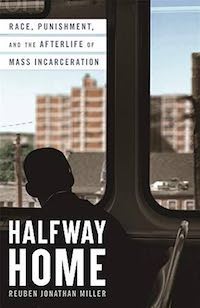Halfway Home: Race, Punishment, and the Afterlife of Mass Incarceration
The problem of mass incarceration has never really been about crime. It’s that the people who Americans are afraid of are subject to a separate set of rules. They live in a separate and altogether different social world, because they belong to a different political community. No social-service agency, no matter how well funded, can bridge the divide between these two worlds, nor can any of our criminal justice–policy reforms. We have not yet come to grips with our problems or imagined an adequate response because our assumptions about the extent and causes of crime have been wrong from the beginning. You cannot treat or arrest or, perhaps, even reform your way out of mass incarceration because mass incarceration is about citizenship, not criminal behavior, and citizenship is about belonging.
A narrative approach to telling the stories and struggles of those who are caught in the depths of mass incarceration. Miller writes eloquently about his experiences and those in his family and beyond.
Most novel – and horrifying – to me was the lengths and troubles parolees must go through to satisfy sometimes-masochistic parole officers. In such a world, it’s hard to imagine those on the inside truly want the inmates to be rehabilitated.
Frankly I’m more of a facts-and-figures guy. But this was a good book. And to those that like the narrative approach, I would recommend it.

Race, Punishment, and the Afterlife of Mass Incarceration